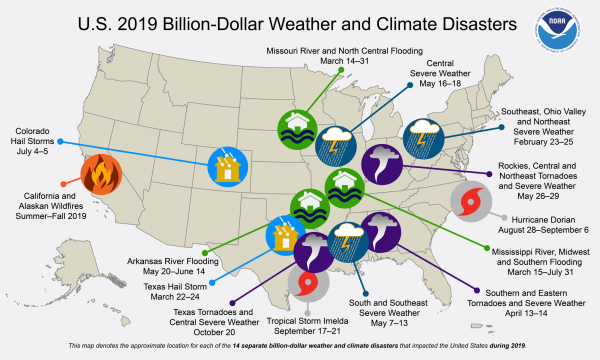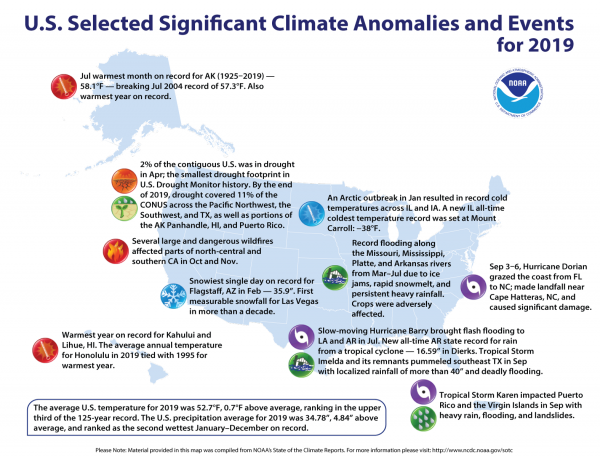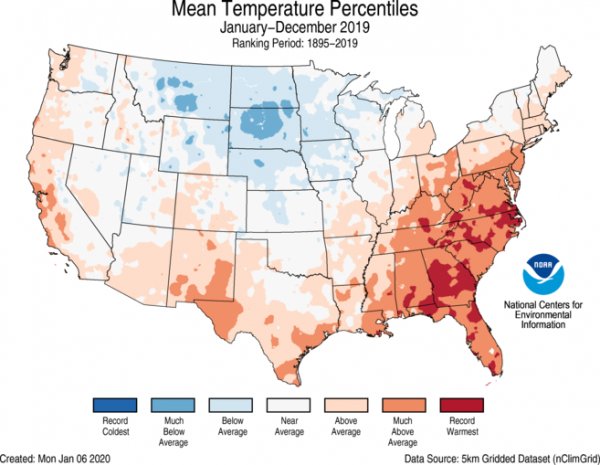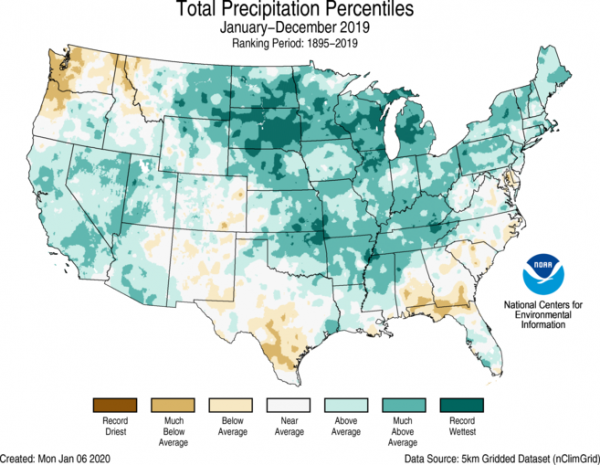By Jerri-Lynn Scofield, who has worked as a securities lawyer and a derivatives trader. She is currently writing a book about textile artisans.
As Australia burns and Indonesia drowns, the National Oceanic And Atmospheric Administration yesterday released 2019 climate data for the United States, Assessing the U.S. Climate in 2019. Yesterday’s release is only a summary of key findings; the full report will be published later this week.
Neither the government of Australia nor that of Indonesia is doing much about the changing climate and instead each still pursues policies that exacerbate the crisis. The headline of yesterday’s piece in The Independent tells you what you need to know, Australia wildfires: Scott Morrison continues to deny climate threat despite ‘apocalyptic’ blazes. The problem:
The international community has taken note. A report published last month by a group of think tanks that ranked 57 countries on their national climate action policies placed Australia sixth from bottom.
A separate study in November ranked Australia as third-worst among the Group of 20 nations. Though Australia just produces a bit more than 1 per cent of the world’s greenhouse gas emissions, it’s the world’s biggest exporter of coal, whose use is a major factor in the warming of the planet.
The bush fires alone have emitted some 350 million tons of carbon dioxide into the atmosphere since last September.
Morrison’s response:
In the midst of the crisis, Mr Morrison has offered mostly a tepid brand of climate denial, pointing to a long history of seasonal fires.
“They are natural disasters,” he told reporters last week. “They wreak this sort of havoc when they affect our country, and they have for a very long time.”
As for Indonesia, Jakarta has been slammed by intense monsoon rains, which have caused mass flooding, and deaths. The situation is by far the worst on the island of Java – where Jakarta is located – but other islands in the Indonesian archipelago, such as the tourist mecca, Bali, have also recently endured worse than normal rains.
Grist reports in It’s not just Australia — Indonesia is facing its own climate disaster on how Indonesia, on Indonesia’s disasters:
Indonesia’s national meteorological agency said the rainfall on New Year’s Day was the heaviest downpour in a 24-hour period since Dutch colonists began record-keeping in the 1860s. Although floodwaters are starting to subside, the Indonesian Red Cross Society warned people to expect more severe rainfall in the coming days.
Jakarta, which is home to about 10 million people, is extremely vulnerable to the effects of climate change, including rising sea levels and extreme weather. It also has dangerous levels of air pollution and the largest uncovered landfill in Southeast Asia. On top of that, the city’s rapidly growing population has faced major water shortages in recent years due to a dearth of groundwater. Meanwhile, rivers are polluted with garbage, and researchers say that at least 20 tons of trash are dumped in the Jakarta Bay each day
Nonetheless, Indonesia, too, continues to pursues policies that exacerbate climate change. The deteriorating situation in Jakarta has prompted Indonesia’s proposal to shift its national capital from Jakarta on Java to Kalimantan (the Indonesian part of the island of Borneo), but that would further spur deforestation – Indonesia’s major policy contribution to fuelling climate change. Borneo had until recently vast tracts of rainforest, but too much of this has been replaced by monoculture palm oil plantations. And shifting the capital will only worsen the problem
As Grist reports:
The city is sinking as quickly as 9 inches a year in some neighborhoods, and about half of it is already below sea level. The country is also the world’s fifth-largest emitter of greenhouse gasses, mostly due to the country’s deforestation habit. And if Indonesia and the rest of the world don’t take measures to slash emissions drastically, researchers say that 95 percent of northern Jakarta will be submerged by 2050.
The country has pledged to cut its carbon emissions by 29 percent by 2030 as part of the Paris Agreement, but the government is still set to rely on coal to generate electricity for the next decade. And a recent survey from YouGov and the University of Cambridge revealed that a whopping 18 percent of Indonesians believe there’s zero link between human activity and the climate crisis.
United States
Likewise in the United States. It’s well known that the Trump administration is promoting policies that promote fossil fuels. Many Democrats have colluded in these policies – and have certainly not supported the drastic changes that are now necessary to stem the climate change crisis. I’m not going to discuss these failures in this post, in which I instead wish to concentrate on the NOAA’s findings.
Key takeaways:
Temperature.
From the NOAA release:
For 2019, the average contiguous U.S. temperature was 52.7°F, 0.7°F above the 20th century average.
This ranked in the warmest third of the 125-year period of record and was the coolest year since 2014. Below-average temperatures, particularly daytime temperatures, were observed across the northern Plains, while above-average to record-warm overnight temperatures dominated across the Southeast and Mid-Atlantic.
Precipitation.
From the NOAA release:
The annual precipitation total for the contiguous U.S. was 34.78 inches, 4.84 inches above average, the second wettest year on record and 0.18 inch less than the total for the wettest year set in 1973*. Record precipitation fell across the northern Plains, Great Lakes and portions of the central Plains. Ten of the last twelve 12-month periods were record wet with the top seven all-time wettest 12-month periods occurring during 2019.
Billion-Dollar Weather and Climate Disasters.
The report included the following chart of billion-dollar weather and climate disasters.

US Selected Significant Climate Anomalies and Events for 2019
And the NOAA highlighted several significant climate anomalies and events. Such as Alaska reported its warmest year on record.
NOTE: additional graphic – Alaska had its warmest year on record (2019) per @NOAANCEIclimate https://t.co/xepop9Rmnk #StateOfClimate pic.twitter.com/H1LhYbULYb
— NOAA (@NOAA) January 8, 2020
Lots of other sobering information – too much to summarize here, so I encourage you to read the short NOAA summary in full, or if time-pressed, just examine this chart. (Common Dreams also published a good summary; see With 14 ‘Billion-Dollar Disasters’ and Record-Breaking Heat in Alaska and Across South, 2019 Was a Year of Climate Extremes for US.)

What Is to Be Done?
So, so much. And soon. But we continue to dither, and look away, and ignore what’s happening around us.




Nothing, humanity is cooked – literally.
Our elected officials deny climate change is happening, and those that don’t pretend to do something about it, but don’t.
And why shouldn’t they?
Go check out Mish Talk. He has a recent post with a reason for every single point why whats happening in Australia isn’t climate change – it’s changes in brush clearing practices, neglect, arson, eco-terrorism, temperatures aren’t rising because they keep changing the baseline and the new temperate readers are make of material that absorb more heat than in prior years…etc, etc.
I see a lot of Mish Talk commentators also post in WolfStreet, pushing the same ideas why climate change isn’t happening.
In a libertarian society, you can’t have a reason for collective action thru government. And that part of the U.S. Constitution that says We The People can collectively do together, that which we can’t do as well separately – it might as well not exist because it’s anti-corporate and pro-people. Can you think of a time you read anything about that part of the Constitution mentioned in the corporate media or Supreme Court of the United Corporations of America?
Scary stuff.
well, why focus on the deniers? If you know that what you want to believe is a lie, BS, nonsense, you have to keep it telling it yourself and others who want to believe it too, in order to make it true. There was a very telling scene during the last british election campaign: In an interview Johnson was confronted by the journalist with an image of a child lying on the pavement of an hospital because of lack of beds, he refused to look at it despite being asked several times. That’s how those mostly manly elites function and create their own reality: coward abominations unable to confront reality as it is, looking away from the despair they help create so they are able to continue their crimes without remorse.
But, on the other hand, humanity does not consist exclusively of such coward psychopaths, though granted, there are a lot of them. Let’s focus on them who try to resist, there are a lot of them, too.
Hey thanks for that. I checked the source that says that there’s been temperature recording device changes, adjustments to Australian historical temperature records and it led to David Collum, who I know of – Organic Chemistry prof at Cornell – and his link led to Jennifer Marohasy who’s got a PhD in biology and then… I came across this 2017 paper coauthored by her :
“The application of machine learning for evaluating anthropogenic versus natural climate change”
https://www.researchgate.net/publication/318931349_The_application_of_machine_learning_for_evaluating_anthropogenic_versus_natural_climate_change
Since data science is my field, I’ve been looking for machine learning models of climate change, not the physical models, specifically General Circulation Models of the IPCC – so this is a great starting point – the paper and all the references she quotes.
Some searching found this:
https://www.desmogblog.com/2017/08/26/marohasy-s-machine-learning-paper-gets-schooled
Maybe there are some problems with the Jennifer Marohasy paper.
Good work that. It went on to say that ‘ the authors work for an Australian industry-funded think tank.’ I took a quick look at this think tank – the Institute of Public Affairs – and it has founded by the Murdoch family back in the early 40s and has been a straight neoliberal organization since the 80s. You read it’s history and it is what you would expect-
https://www.sourcewatch.org/index.php/Institute_of_Public_Affairs
The Murdoch press has been assigning news about the fires to page four recently and are hoping that people will not notice the chocking smoke in the air.
Perhaps the people who DO notice the choking smoke in the air can be brought to wonder why the Murdoch Press does not notice the choking smoke on Page One of the Murdoch Papers. Perhaps those people who can be lead to notice that can be further lead to burn down the Murdoch’s credibility along with all the burning trees.
As to corporations yes I can, at least up to the civil war, corporations had no rights that we would associate with people. In fact John Quincy Adams brought such a case for the such rights over state rights in the 1820’s. He lost. How things have changed.
As for the politicians-
“It is difficult to get a man to understand something, when his salary depends on his not understanding it.” Upton Sinclair
Perhaps the cure for that problem is to grow a crop of politicians who salary will depend on understanding something. The Sanders model of vast masses of tiny little contributions will be a step in that direction.
As has been mentioned before, it is known that the growth of CO2 emissions halved during the global financial crisis.
This is the rate of growth slowed, not that CO2 emissions were NOT still added to the atmosphere.
https://www.theguardian.com/environment/2009/jun/25/carbon-emissions
This decrease in economic activity was forced on the world by the GFC, and the developed nations immediately attempted to get their economies back to trend.
I don’t believe people are ignoring what is happening.
Instead one is seeing local responses to impending climate change, where resources are used to harden homes and cities to resist predicted events.
But suggesting the immediate fix that buys more time, that world wide economic activity be decreased is a non-starter.
The more developed nations will likely spend even more resources (and emit more CO2) as they “batten down the hatches” in view of climate change.
Besides, there will always be economic voices, in this case Tyler Cowen, suggesting not to worry, that a climate change salvation rabbit will be pulled out of the hat.
“Want to Help Fight Climate Change? Have More Children”
https://www.bloomberg.com/opinion/articles/2019-03-14/want-to-help-fight-climate-change-have-more-children
You can’t have decreased economic activity (and quite probably decreased carbon – there are those that will argue they could be decoupled. However I don’t think we’ve never actually seen them be in reality) without massive suffering under the existing economic system (call it capitalism, I just don’t want to go down some rabbit hole haggling over terminology endlessly).
The obvious conclusion here is that the economic system needs to change.
Forgive me, but I have no idea what your point is, if in fact you have one. The climate is unhinged and choices are bad or worse.
My point is that the political leaders in nominal control know what can be done to slow the onslaught of climate change, that being to NOT pursue economic growth and NOT pursue human population growth.
This could result in a society that consumes less, recycles more, walks more, builds smaller homes, does less driving and maybe has fewer resource securing wars.
To avoid massive suffering, there must be more consumption equality such that food, medical care and housing is better distributed (in the USA, for sure).
But I don’t see the political will for this as it is counter to all the “must grow the economy” belief manifested in the press and political sphere.
If the choices are bad or worse, maybe choosing bad is the short term way to proceed.
Yes, and billions will die, which will be the remediation.
“…billions will die, which will be the remediation.”
in my most cynical moments, i reckon that’s why we can’t have universal healthcare, or fair economic policies,or a vote that counts without a doubt, and why we have as much influence on things as random chance(the princeton study on oligarchy).
it’s why the second amendment is the only one(besides the all but useless Third) that hasn’t been abrogated…and why the Bosses can’t be bothered with purposeful antibiotic resistance(Big Ag),climate change, nukes or forever war.
let alone gross inequality and widespread poverty.
fuck us…they want us dead.
then they can adapt to the warmer world, and wait til the climate stabilises.
from HG Wells(Morlocks were the genetically labotimized small workforce they brought along to the bunker, who eventually evolved), to Orwell and Huxley, to Logan’s Run to Oryx and Crake and Aeon Flux to Altered Carbon and an hundred more.
P K Dick had visions of a Roman Mind Virus that carried on through the ages within the Elite…and Operation Paperclip was like a booster shot, I figger.
meanwhile, there’s grasshoppers hopping around here in January, when it’s froze more than usual.
…and i have the beginning of Buds on the Pear Trees.
“Doom, Doom!” he yelled as they carried him from the walmart.
Truer words were never spoken. As I’m prone to say you don’t have to believe in reality it believes in you.
Well . . . its called Jackpot Design Engineering for a reason. Maybe we could just call it the Jackpot Plan for greater clarity.
That doesn’t mean we have to accept their goal for us as being our fate. If some of us undesirables can figure out how to survive the Jackpot Plan, we should go right ahead and do so. And if we can help more of eachother survive by forming organized co-survival groups than if we tried separately surviving on our individual own, we should go ahead and do that too.
Europe, relatively far from El Niño, has “enjoyed” in 2019 its hottest year on record, above 2016.
And I was just reading that 2019 was the hottest and dryest on record – ever – in spite of what some conservative pundits claim-
https://www.newscientist.com/article/2019-2019-was-australias-hottest-and-driest-year-on-record/
And that precipitation map for the United States. The area that it is heaviest – aren’t those where your farmlands are mostly concentrated?
Yup. Makes it hard to seed and hard to harvest.
NOW . . . Farmer Gabe Brown operates around Bismark, North Dakota. Is Bismark within one of the record-heavy-rain zones? If it is, did record heavy rains fall on Farmer Brown’s farm? If they did, did they cause Farmer Brown the same timely seeding and harvesting problems as they caused for his neighbors?
If they did, then his methods are not enough to mitigate the local effects of record heavy rains. But if they did NOT . . . . if he could still seed timely and harvest timely deSPITE the record heavy rains; then does this allow us to hope that if every farmer in the record heavy rain belt were to use Farmer Brown methods, that every farmer in the record heavy rain belt would get Farmer Brown results?
And I see that much of Wisconsin had heavy rain. And some of it had record heavy rain. Did farmer Gary Zimmer of the Otter Creek Research Farm have the same bad results as all his conventional neighbors? Or could he get his planting and harvesting done more timely than his conventional neighbors? There are lessons to be learned either way.
https://www.ottercreekorganicfarm.com/
And what about Mark Sheppard of Restoration Farming permaculture project also in Wisconsin?
Was he in a heavy rain zone? If so, did he have the same problems as his conventional neighbors?
Why or why not? And if not, are there lessons to be learned and applied?
https://www.forestag.com/pages/mark-shepard
NASA: Major Greenland Glacier Is Growing
Jakobshavn (glacier) has spent decades in retreat—that is, until scientists observed an unexpected advance between 2016 and 2017. In addition to growing toward the ocean, the glacier was found to be slowing and thickening. New data collected in March 2019 confirm that the glacier has grown for the third year in a row, and scientists attribute the change to cool ocean waters.
The Ozone Hole: Closing the Gap
Through an international effort to decrease the use of CFCs, the ozone layer is starting to mend, and scientists believe it should mostly recover by the middle of the 21st century. This series of satellite images shows the ozone hole on the day of its maximum depth from 1979 through 2018.
Seeing Through the Smoky Pall: Observations from a Grim Indonesian Fire Season
Meanwhile, the troubles in Indonesia extended below the lush land surface. Coastal Sumatra and Borneo are home to some of the most extensive tropical peat deposits in the world. Peat is a soil-like mixture of partly decayed plant material that builds up in wetlands, swamps, and partly submerged landscapes.
But when swamps with underlying peat are drained, the bacterial communities shift. The peat begins to emit carbon dioxide into the atmosphere as it decomposes, and burning dried peat greatly accelerates the process. According to Vrije Universiteit Amsterdam scientist Guido van der Werf, peat fires release three times as much carbon monoxide and ten times as much methane as savanna or grassland fires. Peat fires also tend to burn at low temperatures and can smolder underground, so they are notoriously difficult to extinguish, sometimes burning for months.…. see article
They are saying Australia might not be habitable in 20 years. I’d submit it never really was, we just had a very mild climate here on Earth. The big things going on under the radar include stuff like a plummeting birth rate almost everywhere; sadness about the climate (that’s a good thing); financiers in panic mode wondering how to make economies function (Mark Carney on the coming oil crisis); and most amazing of all is what happened this week: We killed Soleimani (or took credit for it); Iran shot off some missiles we could not intercept just to tell us they could; it took us 3 days to get our story straight; now Trump is praising the self control of the Iranians. Has anybody else noticed how bizarre this is? And, oh yes, Netanyahu is probably headed for jail. I’m impressed the world isn’t totally hysterical.
How about some old-school music to go along with our present times then?
https://www.youtube.com/watch?v=_xRCbdFrSSc
yes, the final stages of the inmates running the asylum…
The Australian Aborigines found Australia entirely habitable for the last 60,000 years. Are they not men?
The rulers of the Western Empire extract wealth by exploiting the earth’s resources and human labor without paying for the adverse costs to the environment and society. The system is designed for them to make a profit.
A current example are North American railroads. Shipping on them has declined for the last two years due to the cut in the use of coal and decrease in manufacturing in general. The railroads countered by implementing Precision Railroading (PSR) across North America. https://en.wikipedia.org/wiki/Precision_railroading
PSR has allowed railroads to weather the downturn in traffic. The length of trains has increased from one to two miles or longer. This cuts the number of crews needed in half. But well-paid workers are being laid off. The control of the trains is more difficult. The wait times and deaths at railroad crossings are increasing.
If climate change is ever going to be addressed, the current system that corporations can do whatever they want to increase their profits at the expense of everyone else must change.
I am Australian but live in France.This article is the first time I have heard a word about the floods in Indonesia, though Andre Vltchek has kept his readers informed on the drastic decline of Indonesia in almost every sphere.
In French news today a scientist called Tom Beer (yes!) from Australia’s CSIRO (government scientific research organization) explained how he was hired in the early 1980s to investigate the effects of climate change on Australia’s fire problems and the likely effects for the future. His 1988 Report distinctly warned the government (I do not know how widely distributed it was) what was likely to happen, and over the years of course nothing was done and he can see how closely the present disaster allied with his forecasts.